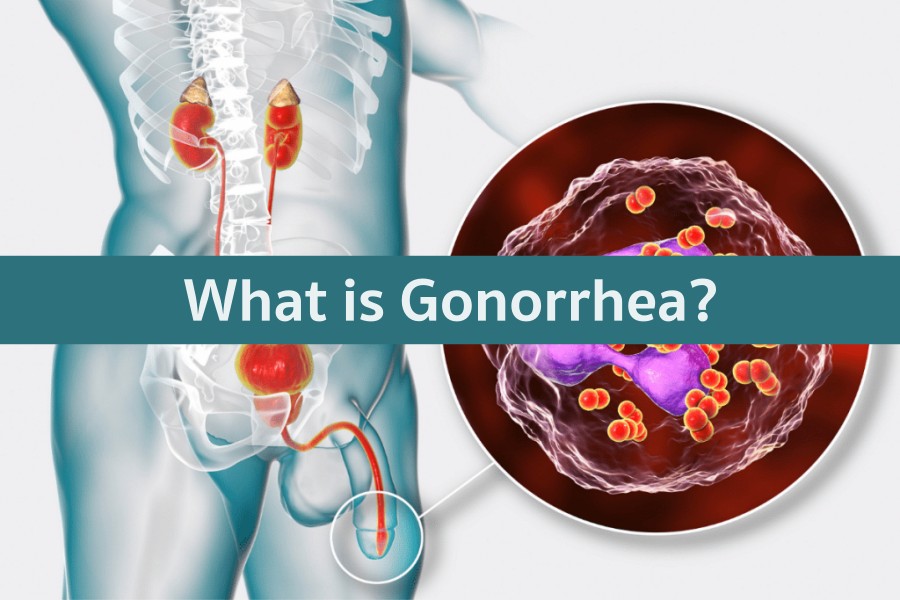Gonorrhea is a common sexually transmitted disease that is caused by bacterium Neisseria Gonorrhoeae and infects warm and moist areas of the body such as the genitals, rectum, eyes, and throat. Anybody who is sexually active is susceptible to this infection, especially when they do not use condoms while having sex.
What are the symptoms of gonorrhea?
For some people, no symptoms occur when they are infected with Neisseria Gonorrhoeae. These people are called asymptomatic carriers. However, this does not mean that they will not spread gonorrhea to their sexual partners. In fact, it is more probable for an asymptomatic carrier ((a person who shows no visible symptoms of gonorrhea) to transmit the disease to their partners.
In other cases, some people may develop symptoms in their penis around 7 days after infection. Most often the first noticeable symptom is a burning or painful sensation while urinating. Other symptoms in the penis may appear later such as:

- Frequent urge to urinate
- A white, yellow, beige, or greenish pus-like discharge or a drip from the penis
- Swelling at the opening of the penis and/or in the testicles
Gonorrhea often does not cause any symptoms in the vagina. When symptoms do appear, in many cases they are overlooked and get mistaken for other non-STD infections such as bladder infection or even vaginal infection. Other symptoms in the vagina can include:
- Painful, burning sensation when urinating
- Frequent urge to urinate
- Increased vaginal discharge
- Bleeding between periods (e.g. after an intercourse)
Other body parts may also be affected when someone is infected by gonorrhea such as:
- Rectum. Symptoms may include itching and pus-like discharge from the rectum and also bleeding.
- Eyes. Pain, increased sensitivity to light and pus-like discharge from either one eye or both of them.
- Abdominal pain.
- A persistent sore throat.
- Swollen joints.
How do I know if I have gonorrhea?
As has been mentioned, while there are possible symptoms that can appear after the infection, it is also likely that you will not experience any symptoms should you contract this infection. However, this does not mean that you do not have gonorrhea. The only way to find out whether you have gonorrhea is by getting tested regularly, especially when you are sexually active.
How does gonorrhea spread?
People can get infected with gonorrhea during sexual contact such as oral sex, vaginal sex, and anal sex. Someone who is pregnant can also transmit gonorrhea to their baby during childbirth. Casual contact such as kissing, hugging, or holding hands does not increase your risk of transmitting gonorrhea in any way.
How do I avoid gonorrhea?
To eliminate any possibility of getting infected with gonorrhea or any other sexually transmitted diseases is by avoiding any sexual contact (oral, anal, and vaginal).

If you are sexually active and have multiple sexual partners, condoms are recommended to lower the risk of getting gonorrhea and other sexually transmitted infections. Please be aware that taking pre-exposure prophylaxis or PrEP will only protect you from getting HIV. PrEP does not prevent other infections, including gonorrhea.

Can gonorrhea be cured?
Just like other sexually transmitted infections such as syphilis, gonorrhea can be fatal if left untreated. Gonorrhea can also cause other complications such as infertility. If gonorrhea is left untreated, the chances of getting HIV are also higher.
Generally, treatments for Neisseria Gonorrhoeae include antibiotics. It is important f to test regularly so that treatment can be initiated as soon as possible should results be positive for gonorrhea. It is important to keep in mind that, while treatments may cure gonorrhea, it will not cure the damage caused by the spread of gonorrhea. Getting tested regularly and taking medication as soon as possible is the only way to avoid this.
Once I get cured from Neisseria Gonorrhoeae , can I get it again?
Yes, if you continue to have sex with multiple partners and do not wear condoms, it is possible to contract gonorrhea again. Please bear in mind that gonorrhea left untreated can also increase your risk of contracting HIV.
Are there vaccines for gonorrhea?
While there is research in this area, there are no vaccines available to prevent Neisseria Gonorrhoeae.
Last Updated on 17/12/2025 by ทีมที่ปรึกษา มูลนิธิเพื่อรัก

